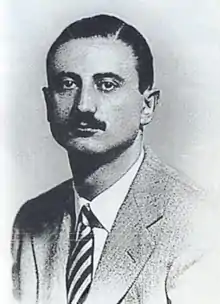Pietro Koch
Pietro Koch (18 August 1918 – 4 June 1945) was an Italian soldier and leader of the Banda Koch, a group notorious for its anti-partisan activity in the Republic of Salò.

Biography
The son of an Imperial German Navy officer, Koch was born in Benevento.[1] Koch served as a lieutenant in the Grenadiers where he was unpopular with his fellow soldiers and was dismissed from the Royal Italian Army in 1939 for insulting a superior officer.[1] Recalled on the eve of the war, he saw continuous service until the armistice of September 1943, after which he moved to Florence.[1]
Settling in the Social Republic in the north of Italy, Koch joined the Special Service of Republican Police led by Tullio Tamburini.[1] In January 1944, he established the Banda Koch as a special task force charged with hunting down partisans and rounding up deportees, including Jews, for the Germans.[1] Koch came under the protection of SS-Obersturmbannführer Herbert Kappler, SD chief in Koch's base of Rome, and as such had a free hand to employ whatever tactics he saw fit with Banda Koch, which soon became a by-word for cruelty and violence.[1] Koch was given his own prisons and torture chambers and continued his activity in Florence and then Milan following the fall of Rome to the Allies.[1] Along with police chief Pietro Caruso, who was independently involved in the killing of partisans, Koch was behind hundreds of deaths; the Social Republic government even ordered an amnesty for political prisoners not charged with murder out of fear that Koch would have them killed.[2]
Feared even by Benito Mussolini for his violent extremism, Il Duce eventually had his close ally Renzo Montagna arrest Koch for his excesses in October 1944.[1] He soon fell into Allied hands, was tried by an Italian tribunal and was convicted of six charges at the High Court.[1] He was executed at Rome's Forte Bravetta aged 26.[1]
References
- Philip Rees, Biographical Dictionary of the Extreme Right Since 1890, 1990, p. 212
- Nicholas Farrell, Mussolini A New Life, Phoenix, 2004, pp. 449-450